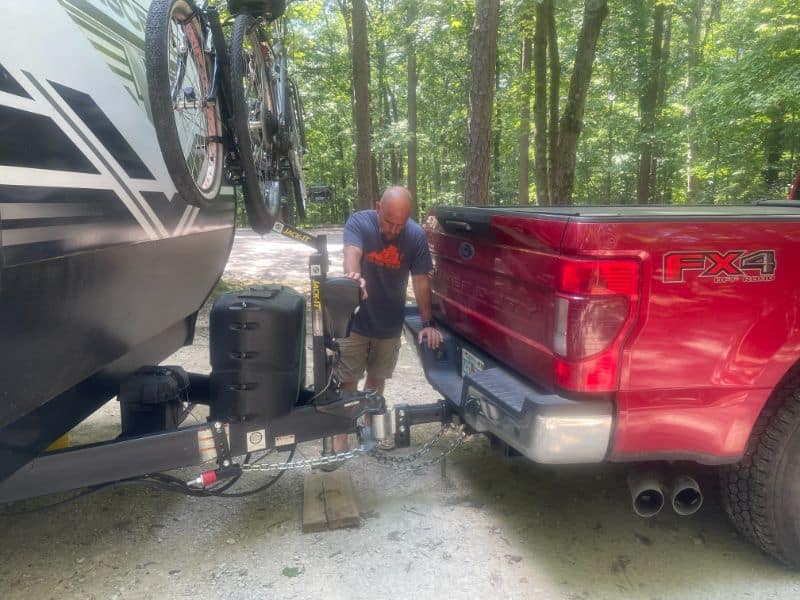You can’t tow safely unless you know the tongue weight of your RV.
- Too little tongue weight can cause uncontrollable trailer sway.
- Too much tongue weight can overload your tow vehicle hitch and rear axle.
As a rule:
- 10-15 percent (~12%) of the weight of a travel trailer should be on the tongue
- 15-25 percent (~20%) of the weight of a 5th wheel should be on the pin
Tongue weight isn’t a fixed number. How you load your trailer changes the tongue weight.
- Adding weight in front of the axles increases the tongue weight
- Adding weight behind the axles decreases the tongue weight
The closer the weight location to the axles, the less on the tongue. So placing a weight directly over the axles will neither increase nor decrease the tongue weight.
If you can remember these six bullet points, you know 90 percent of what you should to keep your RV safe!

How to Calculate Tongue Weight?
You can calculate tongue weight a few different ways:
- If you know the total weight of your camper trailer, you can subtract the weight on the axles to find the tongue weight.
- TW = GTW – GAW
- If you know the weight of your tow vehicle, you subtract the weight of your tow vehicle from the weight of the tow vehicle WITH the camper trailer coupled to find the tongue weight.
- You can also measure tongue weight directly with a tongue weight scale, heavy-duty platform scale, or by using the bathroom scale method.
Please understand that tongue weight isn’t a fixed number! Tongue weight is a percentage of the Gross Trailer Weight (GTW), aka, a percentage of a fully loaded RV trailer!
What’s the Difference Between Tongue Weight and Pin Weight?
Towable RVs come in two flavors:
- Travel Trailer
- 5th Wheel
Travel trailers usually have a ball coupler welded to an A-frame trailer tongue. 5th wheels normally have a kingpin coupler on the nose (specialty models, like converted horse trailers, might use gooseneck hitches).
All trailers act as a lever and fulcrum: the tongue is the lever, the axles are the fulcrum.
So usually, “tongue weight” refers to travel trailers, and “pin weight” refers to 5th wheel trailers.
Is Tongue Weight the Same as Hitch Weight?
These terms are often used interchangeably, but no, tongue weight isn’t (necessarily) the same as hitch weight.
Tongue weight is whatever trailer weight is unsupported by the axles of the camper. If you add tongue weight plus axle weight, you’ll get the total weight of the camper. So TW + GAW = GTW.
Hitch weight is the total weight carried on the hitch of the tow vehicle. Hitch weight is the sum of the tongue weight plus hitch equipment.
Example: a 770-lb tongue weight + 125-lb weight-distribution hitch = 895 lb hitch weight.
You might be wondering, “So if my tow vehicle is rated for 1,000 lbs ‘tongue weight,’ do I have to add in the weight of my hitch?”
I answer this question in more detail in myths and misconceptions about weight distribution hitches.
The short answer is that SAE J2807 specifies a standard hitch equipment weight of 55-75 lbs depending on maximum tow weight. So if your hitch weighs more than 75 lbs, such as a Hensely hitch or Weigh Safe hitch, then yes, you should account for the extra weight of the hitch equipment.
Can I Pull “X” Trailer with “X” Tongue Weight?
Maximum towing capacities issued by auto manufacturers are for best-case scenarios. In most cases, you will not be able to tow up to your maximum advertised capacity.
You must also read the fine print! Almost all pickup truck and SUV manufacturers specify that you must use a WDH if you’re flat-towing more than 5,000 lbs. Ford, Nissan, Ram, and Toyota all specify 5,000 lbs. GMC/Silverado specify 7,000 lbs. (Numbers applicable for 2021 half-ton pickup truck models).
Usually, maximum towing capacities are based around 10 percent tongue weight. For instance, they assume a 10,000-lb trailer has a 1,000-lb tongue weight, so if your Class IV hitch is rated for 1,000 lbs, you can tow a 10,000-lb trailer!
That’s opportunistic, to say the least. More than likely, your 10,000-lb trailer will have, say, a 12 percent tongue weight. That’s 1,200 lbs. Which overloads your hitch. With a 12 percent tongue weight, you could only pull an 8,333-lb trailer.
Can I Trust the Manufacturer’s Stated Tongue Weight?
All RVs have an estimated tongue weight from the manufacturer. As a rule, this tongue weight is measured at “factory weight.” That means an empty RV with no customer cargo, empty freshwater tanks, possibly empty propane tanks, and possibly no batteries!
In the case of a typical travel trailer with two 100Ah batteries and two 30-lb propane tanks, just filling up your tanks and adding batteries can add 150-180 lbs of tongue weight!
Do not rely on the stated tongue weight. Measure it yourself! The difference can be significant!
What Happens If the Tongue Weight Is Too Light?
As you can see, too little tongue weight is a recipe for disaster. As a rule:
- 10-15 (aim for 12.5) percent of the weight of a travel trailer should be on the tongue
- 15-25 (aim for 20) percent of the weight of a 5th wheel should be on the tongue
If your trailer has insufficient tongue weight, it will tend to easily sway side to side. In severe conditions, the sway may amplify until the oscillations completely overwhelm your tow vehicle.
Insufficient tongue weight can also cause “porpoising” or excessive bounce, where the trailer teeters and totters. This exerts enormous stress on the trailer ball and can even cause the coupler to disconnect! It also reduces the grip and control of the tow vehicle’s rear tires.
Generally, insufficient tongue weight is more of a problem with travel trailers than 5th wheels, and excessive tongue weight is more of a problem with the latter. RV manufacturers try to minimize tongue weight so customers can maximize their towing capacity. But if improperly reduced, tongue weight could easily cause a crash or collision.
What Happens If the Tongue Weight Is Too Heavy?

For the most part, overloading your tongue doesn’t have a significant impact on your trailer itself. However, in extreme cases, excessive tongue weight can overstress your trailer tongue and cause fatigue cracking.
However, excessive tongue weight can still be dangerous – because of your tow vehicle!
If your tongue weight exceeds the hitch weight or payload capacity of your tow vehicle, you can overload the rear axle of the tow vehicle. This can cause tire blowouts, broken studs, bottomed-out springs, bent axles, and a host of other problems. Excessive tongue weight can also diminish vehicle handling, particularly when turning and braking.
How Do I Adjust My Tongue Weight?
Weights farthest from the axle[s] have the most impact on tongue weight.
- Adding weight in front of the axles increases the tongue weight
- Adding weight behind the axles decreases the tongue weight
If your tongue weight is too much, try to remove weight positioned close to the tongue. This can include batteries, spare propane tanks, and spare tires. If your trailer is poorly designed with water tanks near the front of the chassis, you may need to empty your tanks, too.
Alternatively, you can add weight to the rear of the camper! Move heavy storage items into rear compartments. Relocate the spare tire to the rear wall.
If your tongue weight is too little, relocate weight so it’s in front of the axles and closer to the tongue. You can try filling up your water tanks, adding a spare battery to the tongue, or relocating your personal cargo to front storage compartments.
Oftentimes, insufficient tongue weight comes from loading too much cargo on the RV receiver hitch. Adding 150 lbs to the rear hitch will often decrease tongue weight by 100+ lbs!
Does a Weight-Distribution Hitch Reduce My Tongue Weight?
Asked and answered at Myths and Misconceptions of Weight Distribution Hitches and The Hidden Danger of a Weight Distribution Hitch.
A weight distribution hitch applies a moment (torque) at the ball connection to redistribute the total weight among all the axles. It doesn’t magically add or subtract weight. Instead, additional weight from the rear axle of the tow vehicle is redistributed to the front axle of the tow vehicle and the axles of the trailer.
Does this reduce the vertical load at the coupler? When torqued, yes, it does. But don’t try to cheat the system! If your vehicle is rated for 800 lbs “tongue weight,” that assumes tongue weight when the camper is uncoupled and on flat ground. Same story with a 5th wheel: it assumes a pin weight when the camper is uncoupled and on flat ground. That’s the tongue weight number you should use.
That’s a Wrap!
That’s the story about tongue weight. It’s a crucial number in keeping you, your family, and your rig safe.
You should measure your tongue weight before every trip. Here’s a guide from Etrailer for how to determine tongue weight at a CAT truck scale.
Tow safely out there!
Leave a Reply